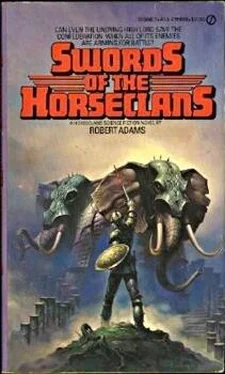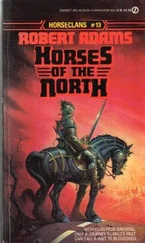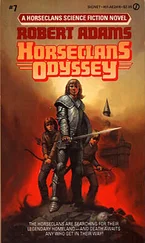Milo nodded. “Something will be done … if the realm survives what’s coming. Captain Maklaud, I want ten of your best riders and twenty-two of your strongest, swiftest horses. You and the ten will ride within the hour—no armor, no bows, or spears, only saber, dirk, and helm. You and the men report back here.
“Captain Mai, as soon as I’ve dispatched the messengers, you and I will ride to King Zenos’ camp.
“Captain Zarameenos, have a detachment of your artificers determine how long it would take to partially or -completely render the bridge unusable.
“Captain Helluh, delegate your command to a good officer, then strip to sword and dirk and helm and take my stallion and a couple of good remounts. I have a very important mission for you; a man of lesser rank or experience couldn’t carry it off.”
Something over an hour later, Milo sat cradling his goblet, his booted legs thrust out before him, hoping that he had made the best decisions. If he had, many thousands of men would die before autumn. If he had not, there would certainly be years of untold misery and suffering and death up and down the much-altered Atlantic coast of what had once been called “North America.” In his case, nearly a hundred years of hopes and dreams and plans would be dissolved into nothingness. All that he and Mara and Aldora could do would be to go back to the Plains, where still roamed clans of Kindred, or take ship and wander the world as he had done alone for almost two centuries.
He ticked off his accomplishments: the Maklaud and two others to Lord Gabos with the main army in the western mountains. The Strahteegos was ordered to patch up some sort of truce with his opponents—a loose alliance of rapacious mountain tribes, as prone to fight each other as anyone else—break camp and march directly to Kehnooryos Atheenahs by way of Theesispolis, whose garrison of Freefighters he,was to absorb. At the capital, he was to reform so as to include all the troops Mara had been able to scrape together, then join Milo with all haste.
Two clansmen had ridden directly for Ehlai with the message for the Kuk to boat his noncombatants to the protection of the capital’s walls, then to ride with every man and woman who could sit a horse and swing a blade or pull a bow, as well as every adult prairie cat, battle-trained or not. Old, crippled, or nursing cats were to guard the herds.
The other five clansmen had ridden to five of Zenos’ former cities that Milo knew to have fairly large garrisons to bid those troops join him by the quickest possible means.
Guhsz Helluh was pounding toward Kumbuhluhnburk, the most southerly of the Middle Kingdoms and long an ally of Kehnooryos Ehlahs. He bore authorizations to recruit any and all condottas—either horse or foot—that he could contact. Price haggling was to be kept to a minimum and Milo had repeatedly emphasized that quantity was of far more importance than quality in this case.
He had sent Aldora and her bodyguard to the capital. For all her failings, the girl was a damned good administrator, and Mara was sure to need her.
With dark approaching, Milo had sent a lancer ahead to advise Zenos that he and Mai were coming. It would help no one to have Mai killed by an overalert sentry. Consequently, they were met at the south end of the bridge by Thoheehs Serbikos and an honor guard of his Karaleenos lancers, who courteously escorted them to the hilltop where Zenos’ new and larger tent—a loan from Milo—had been erected. There waited King Zenos, hulking Komees Greemos, and the savory smell of a roasting boar, which Greemos had singlehandedly slain near the river.
As he swung from his saddle, Milo bluntly said, “Your Majesty, gentlemen, I bear tidings of great import to us all. I suggest we talk first, then dine … if anyone still has an appetite.”
When Milo and Mai had finished, there was a moment of silence as their listeners digested the shattering news. Then Greemos glared hatred at Milo, snarling, “It’s all your fault, you damned, unnatural barbarian upstart! If you hadn’t set your mind to annexing the best part of our lands and driving us to the wall, none of this Zastros business would be happening. If I thought I could kill an unholy thing like you, by Jesus, my steel would be in your guts this minute!”
King Zenos pounded his fist on the table, his face dark with anger. “Enough, enough, damn you for a fool, Greemos, enough I say!” When he had the silenced Strahteegos’ attention, he snapped, “We’ve no tune for name-calling or blame-laying or digging into old wounds; I, at least, recognize the facts that my late father and I and you but inherited the certain results of my grandfather’s greed and duplicity; he left Kehnooryos Ehlahs no choice save to neutralize the threat Karaleenos constantly poised under him.
“But this is the dead past. We must look to the future, and there will be no future—for any of us—if we fail to stop King Zastros, which we cannot do if we do not stand as one with Lord Milo. As of this moment, we are allies. Now, have the meal served. After that, we’ll discuss strategy and I’ll give my orders to you and Serbikos.”
By noon of the following day, the scanty Karaleenos baggage was trundling north across the bridge. Shortly they were followed by columns of tramping infantry, a smattering of cavalry, and a few mounted officers.
Young King Zenos had taken a hundred lancers and ridden south and west, into the mountains to assure his kinsmen—both his mother and his grandmother had been the daughters of the chieftains of powerful mountain tribes—that he was alive, to alert them to the approaching danger, and prepare them for the hordes of lowland refugees who would shortly seek sanctuary in their domains. He and Milo had agreed that the mountain warriors could be of more military value if they remained in or near their home ground nibbling at Zastros’ western flank, retarding his advance with harassing raids, picking off stragglers and scouts, even ambushing smaller units … anything to buy a little more time.
Greemos and a score of officers had taken detachments of cavalry south and east to warn the inhabitants of cities and towns and villages to take livestock and valuables and flee to the mountains, after burning all standing crops and destroying foodstuffs and supplies they could not take away. If the huge army could not subsist on forage, more strain would be placed- upon Zastros’ lines of supply, which might buy precious time.
Thoheeks Serbikos, his officers, and the bulk of the cavalry had fanned out northward on a far more delicate mission. They were to contact the leaders of the various Karaleenos resistance movements in the territories Milo had conquered, explain the present danger, inform them of their former sovereign’s alliance with the conqueror, and urge them not only to refrain from rebellion upon the withdrawal of Milo’s garrisons, but to form themselves into units, arm, and march to swell the forces now assembling to repel King Zastros’ horde.
Zenos, Milo, and all the senior officers had agreed that their present position was as good a defensive site as they might find. At this point, there was a bare forty miles of plains between the saltfens and the mountains. The River Lumbuh in itself presented a formidable barrier—for almost all of the forty miles of lowland, it ran both wide and deep, with but the one bridge spanning it. Miles upstream were a couple of fords, but they were said to be narrow and treacherous at best and could be easily defended by small forces.
Milo put the most of his forces and those of his new ally to vastly enlarging the camp and to making a true, palisaded castra of it—the artificers laid out and marked the courses of the huge rectangle, and then the troops were set to digging the ditch that would front all four sides. Milo put even the wounded to work, whittling points onto wooden stakes and making caltrops, then dumping their handiwork into old latrines to “season.”
Читать дальше












